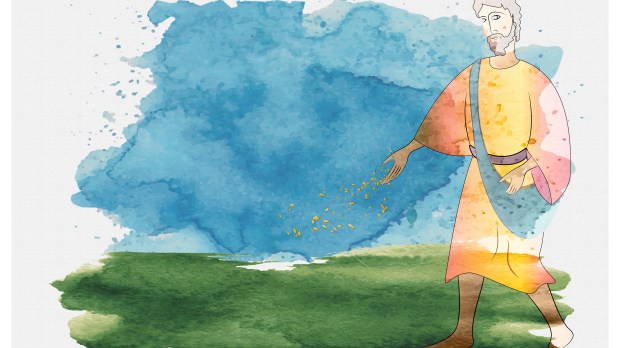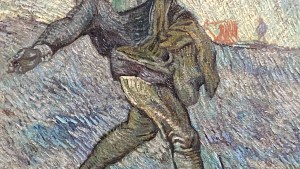In the parable of the sower and the seed, Jesus’ attention is actually on dirt … and he seems to feel sorry for it. Dirt is probably the best tangible symbol for the reality of nothingness. We refer to inexpensive things as being “dirt cheap,” or of a person who slights us as “treating us like dirt.” Jesus in this parable is helping us to address our personal experience of nothingness, and the Lord’s bottom line is this: He wants it.
What we can become
As I hear Jesus in the parable speak about three kinds of places not receptive to his Word — the path, the rocky ground, and the thorns — I presume that he is speaking about me. That is, the Lord is addressing things about me that are inattentive, superficial, and self-absorbed. But what brings me great hope and encouragement is that, even in knowing this about me, Jesus does not give up on me. Rather, the Lord provides the very thing that alone can change those conditions in me and in you. And that is himself, the Word of God made flesh, symbolized by the seed.
Cardinal Joseph Ratzinger wrote a beautiful reflection on this:
The Word of God really penetrated the earth. When the text says that the Word, or the seed, bears fruit, it means that the seed actually sinks into the earth, assimilates the earth’s energies, and changes them into itself. People can become fruitful soil for God’s Word. They can become this soil by providing, as it were, the organic elements in which life can grow and mature; by drawing life themselves from this organic matter; by becoming themselves a word formed by the penetration of the Word; by sinking the roots of their life into prayer and thus into God. To be soil for the Word means that the soil must allow itself to be absorbed by the seed.
The path
Some seed fell on the path where birds came and ate it up — those who hear the Word of God without understanding it. The evil one comes and steals away what was sown in their heart. The Lord is alerting us to the kind of vigilance and reflectiveness needed for a happy life. St. Thomas Aquinas comments:
As the path is free for all who care to walk, so does the heart lie open to every chance thought. So it is that when the Word of God falls upon a heart that is careless and vain, it falls by the wayside and is doubly imperiled.
Some of the words that the incarnate Word of God speaks to help us overcome our inattentiveness are these:
- “What are you looking for? Come and see.
- I will not leave you orphans; I will come to you
- I do not call you servants; I call you friends.
- As the Father has loved me, so I have loved you.
- I know my sheep.
- I mean to stay at your house today.
The rocky ground
Some seed fell on rocky ground where the soil was not deep, and then, when confronted by tribulation or persecutionbecause of the Word, those non-deep folks immediately fall away.
The rocky ground represents a hardness of heart. St. Thomas Aquinas says:
Hardness of heart is contrary to charity, for it is in the nature of love to melt things. Hardness means “locked up in itself” or “narrowed within its own limits,” and love, since it causes the lover to be moved to what he loves, is a thing that liberates, widens, and pours itself out.
Jesus understands that often what causes us to become locked up in ourselves is the insecurity and sadness caused by the experience of our own nothingness. The Word speaks words like these to keep us from living on the surface:
- Take courage! It is I. Do not be afraid!
- Do not let your heart be troubled. Peace I give you. My peace I leave you.
- I do will it — be cured.
- Whatever you shall ask in my name, that will I do
- The very hairs of your head are all numbered!
- Your sorrow will be turned into joy.
- Take heart! I have overcome the world.
The thorns
The thorns represent the “worldy anxieties” that we let dominate: “cares that we cultivate almost addictively and compulsively in order to keep ourselves busy about ostensibly important matters, so as to give our lives meaning and to avoid having to trust God absolutely” (Erasmo Leiva-Merikakis). When this kind of nothingness gets the better of us, we in effect choke the Word of God, and it bears no fruit in our life.
Some of the seeds that the Word lets fall among the thorniness of our life so as to save us from our fallenness are these:
- Neither do I condemn you; go, and sin no more!
- Come to me, all you who are weary and find life burdensome, and I will refresh you.
- Take my yoke upon your shoulders and learn from me, for I am gentle and humble of heart. Yours souls will find rest, for my yoke is easy and my burden light.
- Come and share your Master’s joy.
Mary, the good soil
St. Thomas Aquinas tells us that “for the growth of the seed, three conditions are necessary, namely, it must be remembered, it must take root in love, and it must have loving care.” And no one exemplifies those three conditions more than does the Blessed Virgin Mary. It is not surprising that the Church’s great mystical writers understand the good soil of the parable to be a symbol of the Blessed Virgin Mary. We join St. Bridget of Sweden in venerating the Mother of God:
O my Lady, blessed be your most blessed womb above all fruitfully sprouting fields. Just as the seed that has fallen upon good ground brings forth for its owner fruit a hundredfold, even so your womb, a virgin-womb and yet most fertile, brought forth for God the Father blessed fruit, more than a thousandfold. The blessed and fertile fruit of the little field of your womb caused high honor for God in heaven, rejoicing for the angels, and, for humans on earth, a lavish flow of sustenance and life.
~
Find Fr. Peter John Cameron’s reflection on the Sunday Gospel each week here.


